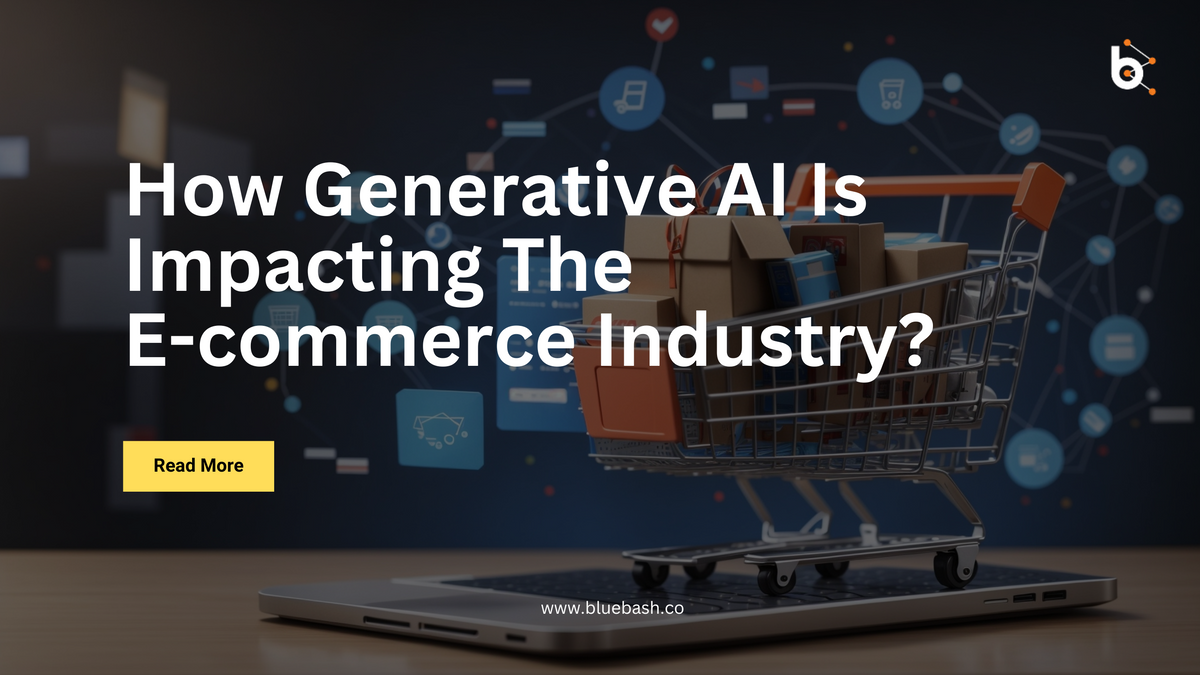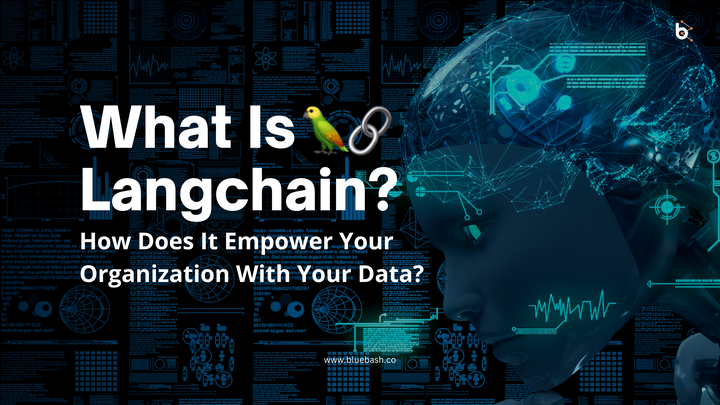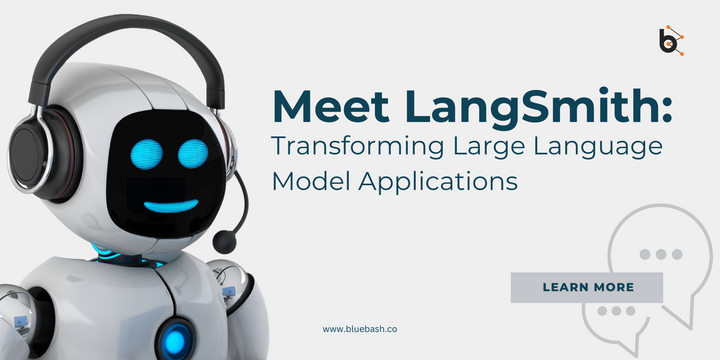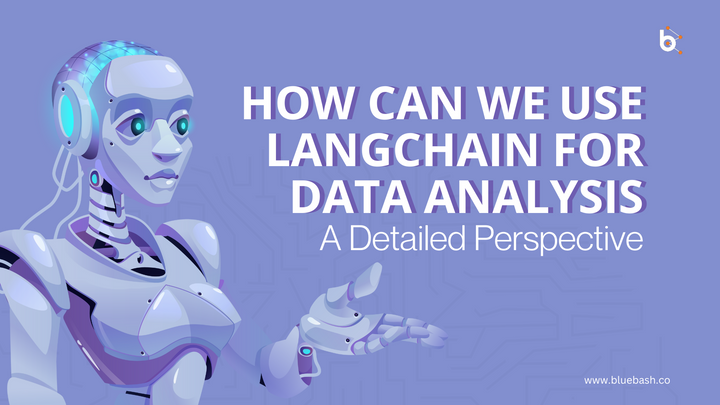How Generative AI Is Impacting The E-commerce Industry?

Generative AI is reshaping industries, including E-commerce. The world of E-commerce has evolved at an unprecedented pace, reshaping the way we shop, interact with products, and discover new items. In this fast-moving landscape, artificial intelligence (AI) has been a driving force, but not all AI is created equal. Enter Generative AI, a fascinating branch of artificial intelligence with the potential to revolutionize E-commerce as we know it.
It generates content and products, with the market set to reach $110.8 billion by 2030. In 2025, it's expected to account for 10% of data, up from 1% in 2021 (Gartner). It has made marketing and operations more efficient and brought the in-store experience online, adding value to customers. In this blog, we will explore the existing use cases, ongoing research, and possibilities of Generative AI in E-commerce.
Understanding Generative AI
Generative AI is a cutting-edge technology that focuses on creating new and original content across various formats and generates novel content in text, images, and video. Recent advancements and massive dataset training empower it to create innovative outputs by learning from data patterns. It fuels creativity and exploration in art, entertainment, design, and data synthesis, benefiting content creators and artists. This marks an AI revolution in E-commerce.
Use Cases of Generative AI in E-commerce
Original Product Design and Configurations: Generative AI can assist businesses in creating new product designs, variants, and collections. This enables companies to offer fresh and unique products that cater to diverse customer needs.
Personalized Customer Experiences: Leveraging E-commerce data and content, generative AI can craft highly personalized shopping journeys and customer experiences based on individual customer data and preferences.
Automation of Content Generation: Generative AI streamlines content creation, from product descriptions to marketing materials, saving time and resources.
Dynamic Pricing: AI can analyze market trends, competitor pricing, and customer behavior to optimize pricing strategies in real time. This allows businesses to maximize revenue and stay competitive.
Virtual Assistants: AI-powered virtual assistants driven by generative AI can provide exceptional customer support throughout the entire shopping journey, enhancing user experience and satisfaction.
Visual Search: Generative AI enables visual search, allowing users to find products using images rather than text-based queries. This technology streamlines the search process and enhances convenience.
Conversational AI: Conversational AI revolutionizes E-commerce by delivering 24/7 customer support with natural language processing, providing human-like interactions and personalized responses. It empowers brands to emotionally engage customers, inspiring instant actions through high-performing digital messaging.
Personalized Product Recommendations: Generative AI algorithms analyze customer data to provide personalized product recommendations based on individual preferences and behavior patterns. This helps customers discover relevant products and enhances their shopping experience.
Virtual Try-On: Generative AI powers virtual try-on experiences, allowing customers to visualize how products will look on them before making a purchase. This technology is particularly useful for fashion and beauty brands.
Dynamic Pricing Optimization: Generative AI algorithms analyze market trends, customer behavior, and other factors to optimize pricing strategies in real-time. This helps E-commerce brands maximize revenue while remaining competitive.
Image Enhancement and Image Transformation: By using Generative AI you can create designs that can be used for product packaging, and images can be made for landing pages, for publications, etc.
You can also edit, enhance an image, and improve image quality or transform images by just giving simple prompts. for ex:- adding an object to an image, removing or changing the background, etc.
Ongoing Generative AI research in E-commerce aims to enhance chatbots, personalize advertising, and optimize supply chains. Research papers primarily focus on recommender systems, sentiment analysis, trust, personalization, and optimization, led by Chinese institutions. Additional reports explore funding trends and top startups in the generative AI landscape, contributing to the expanding use cases in E-commerce.

Possibilities of Generative AI in E-commerce
The possibilities of generative AI in E-commerce are vast. As technology advances, we can expect further innovations in areas such as virtual reality shopping experiences, hyper-personalization, and predictive analytics.
Generative AI is reshaping the E-commerce industry by providing personalized experiences, optimizing operations, and driving innovation. It’s an exciting field with immense potential for growth and transformation.
Benefits of using Generative AI in E-commerce
- Enhanced Customer Engagement: Generative AI enables E-commerce companies to provide personalized and empathetic shopping experiences, fostering stronger customer engagement.
- Improved Customer Loyalty: Personalization powered by Generative AI can help build customer loyalty by catering to individual preferences and needs, making customers feel valued and understood.
- Increased Sales: Tailored product recommendations generated by AI algorithms can drive higher conversion rates, leading to increased sales and revenue for E-commerce businesses.
- Efficient Visual Search: Generative AI enables visual search capabilities, allowing users to find products using images, streamlining the search process and improving user satisfaction.
- Enhanced Customer Support: AI-powered chatbots can provide efficient and 24/7 customer support, addressing queries and issues promptly, and enhancing the overall shopping experience.
- Time and Resource Savings: Although collecting and analyzing customer data can be resource-intensive, Generative AI automates this process, saving time and resources for E-commerce businesses.
- Seamless Integration: With expertise in integrating Generative AI algorithms into existing E-commerce systems, disruptions are minimized, ensuring a smooth transition to AI-powered personalization.
- Tailored Architectures: Customized architectures for E-commerce projects, ensuring that AI solutions align with the specific needs and goals of the business.
- Innovative AI Features: E-commerce companies can develop and integrate cutting-edge Generative AI features, enhancing their platforms and staying competitive in the market.

Challenges of Generative AI in E-commerce:
Data privacy: Generative AI algorithms use consumer data to make personalized recommendations and predictions. Collecting and processing this data raises concerns about privacy and data protection.
High initial investment: Implementing generative AI can be costly, requiring an investment in infrastructure, computational resources, and skilled personnel. This initial investment may pose a challenge for some businesses.
Computational power requirements: Generative AI often requires large amounts of computer processing power, which may not be readily available to all businesses. This can limit the adoption of generative AI in E-commerce for some organizations. Through this, you can get numerous AI-powered E-commerce solutions.
Ethical considerations: The use of generative AI raises ethical questions regarding the ownership and authenticity of generated content. Businesses need to consider the ethical implications of using generative AI and ensure transparency in their practices.
Integration with existing systems: Integrating generative AI into existing E-commerce systems can be complex and require significant technical expertise. Ensuring seamless integration and compatibility with other systems can pose challenges during implementation.
Despite these challenges, generative AI offers immense potential for transforming the E-commerce industry. By addressing these challenges through careful planning, businesses can leverage the benefits of generative AI to enhance customer experiences, optimize operations, and drive innovation.
Conclusion
As innovation in generative AI accelerates, new opportunities continue to emerge. Models like ChatGPT and Midjourney are already being used in various professional and consumer applications, hinting at their potential integration into existing E-commerce platforms. We can expect to see generative AI embedded in specialized E-commerce applications, offering tailored experiences to users.
Generative AI has the power to redefine the E-commerce landscape by introducing fresh content, enhancing personalization, and optimizing various aspects of the shopping experience. While ethical concerns and accuracy must be addressed, the potential benefits of generative AI in E-commerce are too significant to ignore. As this technology continues to evolve, it's likely to become an integral part of how we discover, shop for, and engage with products online.
Why Choose Bluebash for Generative AI in E-commerce?
Building Generative AI solutions requires specialized skills often absent in E-commerce. Partner with us for our proven track record in AI and E-commerce, allowing you to focus on business growth while we handle the complex AI complexities. With numerous successful projects, Bluebash is your trusted partner for practical AI solutions.



